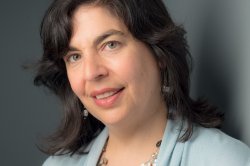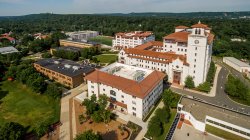Dr. Amanda Birnbaum
Professor, Public Health
Posted in: Spotlights

Name: Amanda Birnbaum
Department: Public Health
1. Please list the degrees you have earned and the institutions attended.
I have a PhD in behavioral epidemiology from the University of Minnesota, an MPH in population and family health from Columbia Mailman School of Public Health, and a BA in English from the University of Bridgeport.
2. What was your college experience like?
My college experience was challenging. Like many students I’ve worked with, I had an interrupted path. I started college full-time, right out of high school, very promising, but also struggling to cope with a challenging family situation and poor mental health. I left school after my sophomore year, and it took two years of work, growth, and healing to be ready to return. When I did, I transferred to a smaller college that was much less prestigious – and stressful – than where I started.
Leaving college was rough, and dealing with other people’s reactions often made it harder. But I have no doubt that this path – which was very different to the path I was expected to take – was right for me. I am absolutely certain that any successes I have now, are at least in part because of that two year “detour” (which turns out not to have been a detour after all).
3. Did you go to college with the intention of being a professor? If not, how did your path bring you here?
Being a professor was definitely not on my mind in college. I was an English major, mostly because I got positive feedback and support from several English instructors. I graduated during a recession, and sent resumes (on paper, in envelopes☺) to just about any organization I could find related to my passions for adolescent health, and reproductive health and justice.
I had a series of jobs – counselor at a clinic, director of volunteers at a social service agency. Eventually I felt had done as much as I could without further study. In researching graduate programs, I “discovered” public health. I enrolled in an MPH program at Columbia, concentrating in population and family health, expecting that I would continue working with the same types of organizations, just with more knowledge and preparation.
In my MPH program, I was introduced to so many other opportunities and was encouraged to explore my strengths and interests. I fell in love with epidemiology and evaluation, and the idea of applying them with a focus on adolescent health and well-being. I graduated, had some wonderful consulting project opportunities in evaluation and research, and realized I wanted more. Researching PhD programs led me to the University of Minnesota, where the Division of Epidemiology included a large group of adolescent health experts. Thanks to my mentors at Columbia and U of MN, eventually I began to imagine myself as “professor material.”
4. What is one thing you wish you had known in your undergraduate/graduate career? Why?
Undergraduate: I wish I had known that most things aren’t set in stone. It would have helped me take more (positive) risks, and not take each decision so seriously.
Graduate: I wish I had known that the culture and expectations of the department where I did my PhD was socializing and shaping me in ways I wasn’t aware of at the time. I’d like to think that knowledge would have pushed me to more deliberately seek meaningful interdisciplinary collaboration, and to be more expansive in exploring a variety of career paths.
5. What is the best part about being an MSU faculty member?
The people. We have an amazing community. Our students, staff, faculty, bring such a wealth of talents, perspectives, life experiences, dedication, passions, ideas. It is energizing and fulfilling to be part of and help serve this community.
6. What does a typical day look like for you?
Email, Canvas, Zoom, reading, writing, multitasking.
7. What are a few of your recent accomplishments?
Making it through two years (and counting) of the pandemic comes to mind!
I recently returned to teaching undergraduates, after about 10 years of teaching only in our graduate program. I’m so excited to get to connect with and support our undergraduates, along with the MPH students.
I began working towards an Urban Naturalist certificate at the NY Botanical Garden. I have been learning so much, and making many connections with public health.
8. What is your favorite class to teach at MSU? Why?
I can’t answer this the way I think it’s intended, lol. Every class is my favorite when I’m teaching it. If my students and I are successful in establishing a lively, safe, open learning environment, if students feel engaged, challenged, and respected – then that’s my favorite class.
9. What advice would you give to incoming students in order for them to succeed?
Be intentionally and relentlessly curious. Let every part of your identity drive your curiosity; you deserve that, and the world needs it. Curiosity is magical – it sparks ideas and creativity, makes you see things as changeable, prompts you to be a flexible thinker, and helps you make almost anything interesting.
Everything takes longer, and costs more, than you think it will. A mentor told me that nearly 30 years ago. When I keep that in mind, I make better decisions. When I don’t, I almost always regret it.
Read and follow directions on your syllabus, assignments, and exams. It will save you time and heartache. Your professors want you to succeed.
